“Everyone” seems to be adding butter to their coffee these days, and this frothy, fatty drink is at the forefront of an even bigger trend…
Biohacking.
“Biohacking” is a term that refers to a loose, “DIY” style of experimental biology that aims to figure out how to alter or optimize various aspects of our physiology.
The idea that you can somehow gain control of systems in your body that you would otherwise never have access to sounds pretty sexy, which helps explain why biohacking is incredibly popular these days.
Well, most of us know we can’t “hack” our way to health, fitness, and vitality through popping nootropics or swilling fatty coffee drinks.
Only a long-term lifestyle of the right habits can get us there.
That said, we can accelerate the process by tinkering with how we eat, train, and supplement.
For example…
- Eating a moderate amount of high-quality protein after weightlifting will help you build more muscle over time.
- Supplementing with creatine will help you build muscle and strength faster.
- Eating a slow-digesting protein before you go to bed will speed up muscle growth.
- Fasted training is a good way to accelerate fat burning.
They’re not exactly game changers, I know, but each contribute slightly to the bottom line, and collectively, add up to something that matters.
Now, the central question of this article:
Is putting butter in our coffee a worthy addition to the list?
Let’s find out.
Why Are People Putting Butter in Their Coffee?
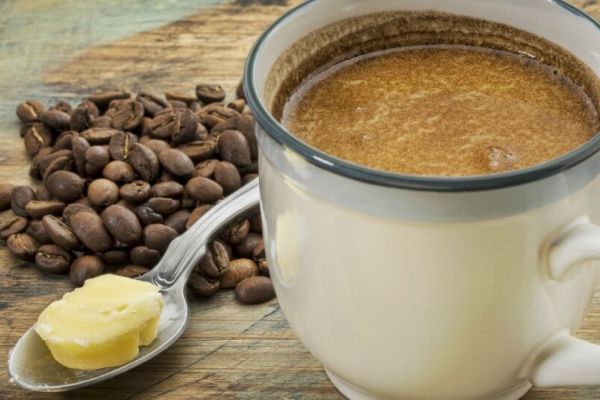
Butter is awesome.
Put them together and you get a double-dose of awesome in your mouth, but does it go further than that? Is this a “biohack” worthy of our attention?
Before we dive into that, let’s quickly learn why we’re even having this discussion. Why the hell are so many people drinking this concoction these days?
Well, this oily coffee beverage was first popularized by Dave Asprey, an entrepreneur and self-styled biohacking guru.
He says that he first learned about the “power of butter” while climbing Mt. Kailash in Tibet, where he was given a cup of tea with yak butter that rejuvenated him in a way he had never experienced before.
A couple years later, he was unveiling his recipe for “Bulletproof Coffee, and soon thereafter, his own coffee beans and oil.
To make Bulletproof Coffee, you mix the following in a blender:
- 2 cups of coffee (he wants you to buy his trademarked brand, of course)
- 1 to 2 tablespoons of MCT oil (ditto)
- 2+ tablespoons of grass-fed, unsalted butter
Knock that back and Asprey says it can change your life. With this drink, he claims you can improve cognitive function, lose weight, kill cravings and help control your appetite, and more.
Can it really live up to all the hype, though?
Can You Really “Hack” Coffee with Butter and Oil?
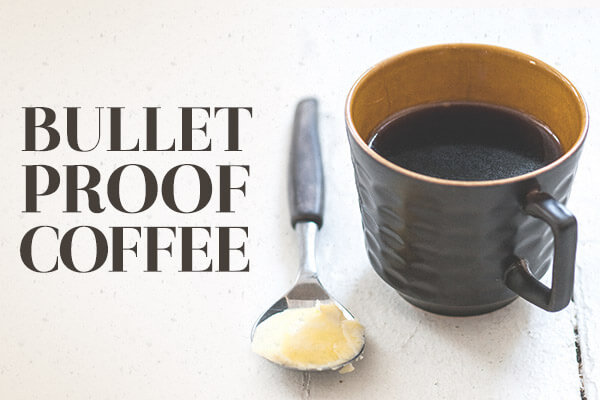
Weight loss. Mental clarity. Boundless energy. Appetite control.
The sales pitch for Bulletproof Coffee is alluring, but can it deliver?
To find out, let’s look at each component separately, starting with the most popular beverage in the world.
The Case for Coffee
Many people consider coffee drinking an unhealthy vice, but research shows otherwise.
Namely, studies show that coffee drinking can provide a variety health benefits, including…
- Increased longevity.
A large study was published in 2012 wherein researchers analyzed the coffee consumption of over 400,000 people.
After adjusting for smoking and other potential confounders, they found that people who drank the most coffee generally lived longer than those that drank less or none, and the more they drank, the longer they lived.
These associations were seen in both caffeinated and decaffeinated coffee, so caffeine alone doesn’t account for the benefits.
- Improved mood.
Any coffee drinker could have told you this, but it’s been validated scientifically as well.
Studies conducted by scientists at Harvard found that regular coffee consumption reduced the risk of depression and suicide by 20% and 53%, respectively.
- Improved physical performance.
The caffeine in coffee improves strength, muscle endurance, and anaerobic performance.
- Weight loss.
Caffeine also speeds up fat loss by speeding up your body’s basal metabolic rate.
- Reduced risk of disease.
Studies show that coffee may reduce the risk of both type 2 diabetes and cancer.
Like anything, though, if you drink too much, coffee can be harmful to your health.
This study, which tracked more than 43,000 people for an average of 17 years, found an increase in all-cause mortality (death by any cause) in heavy coffee drinkers (32+ ounces per day).
As it’s observational research, the actual mechanisms of why this could be were not explored, but here are two sensible rules of thumb for healthy coffee consumption:
1. Drink your coffee early in the day so it doesn’t interfere with your sleep.
Too little sleep can cause a host of health issues including inflammatory responses and impaired endocrine and metabolic function.
2. Keep your coffee intake below 4 8-ounce cups per day.
Remember that many places sell 16, 20, 24 or even 28-ounce “cups” of coffee.
Do We Need to Worry About “Mycotoxins”?
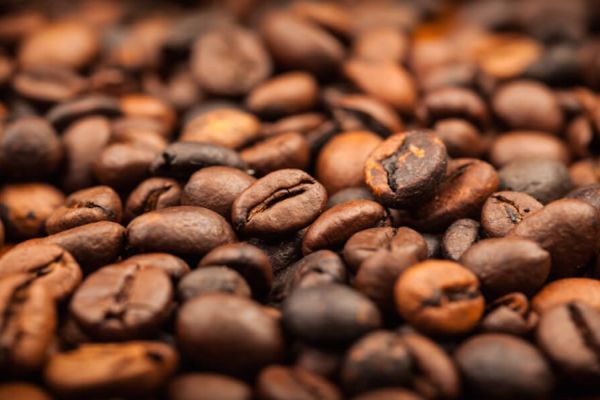
What if your coffee were infested with toxic molds, and what if this was robbing you of health and mental and physical power?
Well, that’s what Asprey says is happening to millions of people around the world, and it bulks large in his marketing for his Bulletproof Coffee.
What are mycotoxins, though, and are they as dangerous and prevalent in our coffee supply as Asprey claims?
Well, “myco” comes from the Greek word mukēs, which refers to fungus or mushrooms.
Thus, mycotoxins are poisonous molecules found in various types of molds that can increase the risk of serious disease such as cancer.
As many types of mold flourish in tropical climates, where coffee is grown, it’s true that drinking coffee may increase your exposure to mycotoxins.
What Asprey doesn’t tell you, though, is low levels of these poisons are found in many other foods and beverages as well, including raisins, various grains, chocolate, peanut butter, beer, and wine.
Simply put, these toxins are everywhere and impossible to avoid.
What Asprey also doesn’t tell you is, like with most poisons, it’s the dosage that determines the danger. And when we’re talking coffee (and food in general), studies show the dosages provided are miniscule.
For example, this study found that the amount of a mycotoxin known as ochratoxin A in 4 cups of coffee is a measly 2% of the level the FAO and WHO deem safe.
Another study conducted in Spain found that the total dietary exposure to the same mycotoxin was just 3% of the levels regarded as safe by the European Food Safety Authority.
The bottom line is our exposure to mycotoxins is tightly regulated, and levels in commercially available coffee are very low.
This is mainly because raw coffee beans are specially processed to remove mycotoxins, and they are further reduced by roasting.
Asprey also says that mycotoxins make coffee bitter, but this simply isn’t true. Tannins are what give coffee its bitterness.
Beware the Love Affair with Saturated Fat
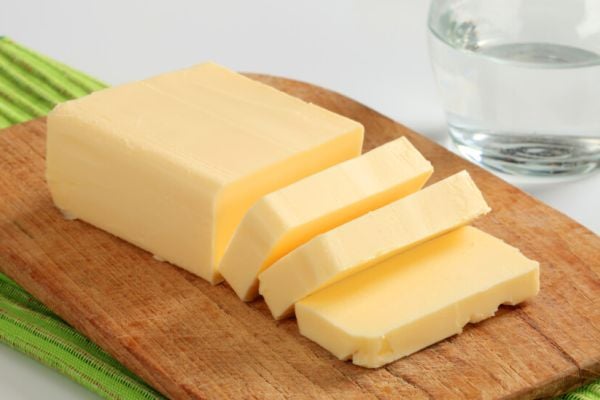
Saturated fat is found in foods like meat, dairy products, eggs, coconut oil, bacon fat, and lard.
If a fat is solid at room temperature, it’s a saturated fat.
The long-held belief that saturated fat increases the risk of heart disease has been challenged by recent research, which has been a boon to the fad diet industry, not to mention the meat and dairy industries (we’ve seen a veritable renaissance of meat and dairy consumption).
The problem, however, is that the research used to promote this movement has also been severely criticized by prominent nutrition and cardiology researchers for various flaws and omissions.
These scientists maintain that there is a strong association between high intake of saturated fatty acids and heart disease and that we should follow the generally accepted dietary guidelines for saturated fat intake (less than 10% of daily calories) until we know more.
Given the research currently available, I don’t think we can safely say that we can eat all the saturated fats we want without any health consequences. And I’d rather “play it safe” and wait for further research before joining in the saturated fat orgy.
What, then, does that mean for putting a couple tablespoons of butter in your coffee every day?
Well, if you eat, let’s say, 2,500 calories per day, then you want to keep your saturated fat intake under 250 calories (or 28 grams) per day.
If you start your day with two tablespoons of butter and MCT oil, that’s your entire day’s allotment of saturated fat (28 grams), which means you’re going to have to pass up other foods you like to eat or you’re going to have to eat more saturated fat than you possibly should.
For example, one egg contains about 1.5 grams of saturated fat, one cup of whole milk contains about 4.5 grams, and 70% ground beef contains about 4.5 grams per ounce.
So yes, you can make buttered coffee work with some creative meal planning, but most people doing it don’t know to limit their saturated fat intake, and research shows this may be increasing their risk of heart disease.
What About MCT Oil?
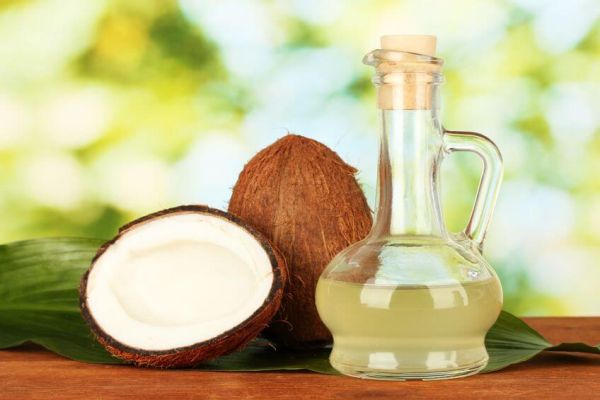
Dietary fat is comprised of chains of carbon atoms that can be anywhere from 2 to 22 atoms in length.
Most of the dietary fat found in the American diet is of the “long-chain” variety, with 13 to 21 carbons per molecule.
Triglycerides are molecules mainly produced by the digestion of dietary fat and are the form in which body fat is stored. When your body breaks down triglycerides for energy, it releases the “fatty acids” stored within for your cells to use as energy.
A medium-chain triglyceride (or MCT, as it’s often called) is a unique type of fat molecule with a medium-length carbon chain (6 to 12 carbons, in case you’re wondering).
The fatty acids found in medium-chain triglycerides and used by cells are called medium-chain fatty acids.
You don’t find MCTs in large quantities in most Western foods, but the best natural sources are butter, coconut oil, and palm oil. There are man-made forms as well (MCT oil), which are usually processed coconut or palm oil.
MCT oil has become particularly popular among the biohacking crowd because it supposedly accelerates weight loss and muscle growth and boosts energy levels.
Well, MCTs are often administered to terminally ill patients to prevent muscle wasting, but that has no relevance to us healthy, resistance-trained individuals trying to build abnormally large muscles.
Its energy boosting properties are equally unfounded, but its use as a weight loss aid has been studied, which brings us to another problem with Bulletproof Coffee…
Does Bulletproof Coffee Help With Weight Loss?

If you want to instantly increase the sales of just about anything, convince people it will help them lose weight.
Asprey knows this as well, and he claims you can lose a pound per day with his miraculous coffee and fasting.
Well, eating very little for days on end will certainly drop weight (including muscle, I might add), but you can do that without paying for his overpriced coffee beans and oil.
Will adding them in help you lose weight faster, though?
We already know the caffeine in coffee increases the amount of calories your body burns, but that’s neither exclusive to Bulletproof Coffee nor significant enough to blazon.
And speaking of calories, each hit of Bulletproof Coffee contains about 450 calories, which is a huge chunk of anyone’s daily calories.
Drinking a large number of calories is generally a bad idea when dieting to lose weight because it doesn’t provide satiety and blunt appetite like most foods, and thus promotes overeating.
So that’s one rather significant demerit for buttered coffee and weight loss.
Now, Asprey is a major proponent of low-carb dieting for optimizing body composition and health, but research shows otherwise.
Restricting your carbohydrate intake doesn’t help you lose fat faster and is actually counterproductive when you’re trying to build muscle.
Thus, using Bulletproof Coffee to, let’s say, follow a ketogenic diet isn’t going to speed up fat loss or muscle growth, and thus, another demerit for the beverage.
And that leaves MCT oil, which some people believe has special properties that aid weight loss.
Well, let’s turn to a study recently conducted by researchers at Universidade Federal do Rio de Janeiro (Brazil), which involved reviewing all controlled clinical studies on MCTs conducted between the years 2000 and 2010.
Scientists narrowed the field down to 14 studies that met their criteria for scientific rigor and found that out of them, six showed improvements in body weight (with eight failing to demonstrate any benefits), one showed improvements in satiety, and four showed an increase in energy expenditure.
While the weight of the evidence is clearly against the use of MCTs to aid in weight loss, the studies that showed benefits might be enough to convince you to give it a go.
Well, before you start guzzling Asprey’s expensive MCT oil, there’s a bit more to consider.
Energy balance is still the overriding rule when talking weight loss.
While MCTs aren’t metabolized and stored as body fat in the same way as long-chain triglycerides, they still contain calories. And regardless of their source, if you eat more calories than you burn, you will inevitably see an increase in total body fat.
Just because the MCT is digested and utilized differently than the normal type of fat we eat doesn’t mean the calories are somehow different or “more efficient.”
The majority of subjects in the studies that showed benefits were sedentary and obese.
That doesn’t mean the research has no relevance to us active, fitness folk, but we definitely can’t take it at face value either and assume that we’ll also reap the minor benefits demonstrated in a handful of studies.
The studies lacked a structured exercise regimen and proper macronutrient balance.
These are bigger issues than the previous point because the inclusion of exercise in a weight loss protocol can easily make other minor variables statistically insignificant.
Furthermore, the dietary protocols used in the studies that found weight loss benefits simply involved keeping subjects in a calorie deficit and matching fat intake. Protein intake wasn’t matched, which is a major confounder because when it comes to weight loss, a high-protein diet beats a low-protein diet every time.
The bottom line is this:
Just because swapping some long-chain fat for medium-chain in a low-protein diet helped sedentary, obese people lose a little more weight does not mean it will do the same for active people eating a high-protein diet (as they should be).
The majority of the studies that showed benefits didn’t last longer than four weeks, with the longest being sixteen weeks.
All the above is reason enough to curb our enthusiasm about this molecule, but I thought this was worth mentioning.
Even in the sedentary obese we can’t be sure as to any long-term value of increasing MCT intake in terms of weight loss and maintenance.
So, as you can see, the pitch for MCTs and MCT oil as a weight loss aid is just another case of “if it sounds too good to be true, it probably is.”
The Bottom Line on Buttery (Bulletproof) Coffee
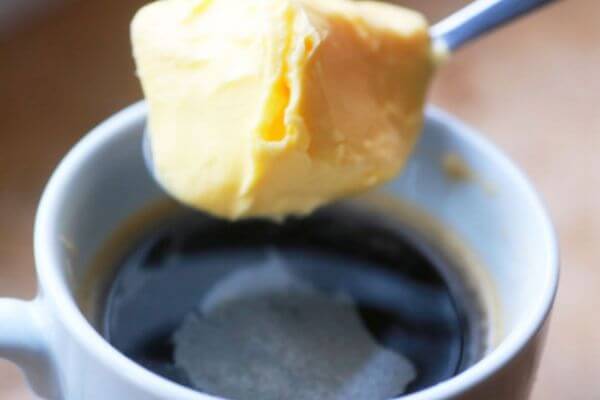
There’s nothing inherently wrong with adding butter or MCT oil to your coffee.
There’s also little to gain from it.
It’s not going to help you build muscle or lose fat faster, and if you’re like many people, it’s not going to blunt your appetite or supercharge your mind. Instead, it’ll probably just upset your stomach and promote overeating.
That said, if you just like the taste or want to see how your body responds to it, give it a go (but I do recommend you reduce the butter and/or MCT oil to prevent a dramatic increase in your saturated fat intake).
What’s your take on putting butter in your coffee? Have anything else to share? Let me know in the comments below!
Scientific References +
- S, M., N, M., & KD, T. (2010). Increased protein intake reduces lean body mass loss during weight loss in athletes. Medicine and Science in Sports and Exercise, 42(2), 326–337. https://doi.org/10.1249/MSS.0B013E3181B2EF8E
- GA, B., SR, S., L, de J., H, X., J, R., CK, M., M, M., C, B., S, M., & LM, R. (2012). Effect of dietary protein content on weight gain, energy expenditure, and body composition during overeating: a randomized controlled trial. JAMA, 307(1), 47–55. https://doi.org/10.1001/JAMA.2011.1918
- AC, R. C., EL, R., & M, S.-M. (2012). Influence of the dietary intake of medium chain triglycerides on body composition, energy expenditure and satiety: a systematic review. Nutricion Hospitalaria, 27(1), 103–108. https://doi.org/10.1590/S0212-16112012000100011
- Toklu, B., Milne, V., Bella, M., & Underberg, J. A. (2015). Rise in Serum Lipids After Dietary Incorporation of “Bulletproof Coffee.” Journal of Clinical Lipidology, 9(3), 462. https://doi.org/10.1016/J.JACL.2015.03.083
- Kromhout, D., Geleijnse, J. M., Menotti, A., & Jacobs, D. R. (2011). The confusion about dietary fatty acids recommendations for CHD prevention. British Journal of Nutrition, 106(5), 627–632. https://doi.org/10.1017/S0007114511002236
- Pedersen, J. I., James, P. T., Brouwer, I. A., Clarke, R., Elmadfa, I., Katan, M. B., Kris-Etherton, P. M., Kromhout, D., Margetts, B. M., Mensink, R. P., Norum, K. R., Rayner, M., & Uusitupa, M. (2011). The importance of reducing SFA to limit CHD. British Journal of Nutrition, 106(7), 961–963. https://doi.org/10.1017/S000711451100506X
- PW, S.-T., Q, S., FB, H., & RM, K. (2010). Meta-analysis of prospective cohort studies evaluating the association of saturated fat with cardiovascular disease. The American Journal of Clinical Nutrition, 91(3), 535–546. https://doi.org/10.3945/AJCN.2009.27725
- GH, van der S., PJ, E., & J, van der L. (2001). Effect of roasting conditions on reduction of ochratoxin a in coffee. Journal of Agricultural and Food Chemistry, 49(10), 4713–4715. https://doi.org/10.1021/JF0105586
- Batista, L. R., Chalfoun, S. M., Silva, C. F., Cirillo, M., Varga, E. A., & Schwan, R. F. (2009). Ochratoxin A in coffee beans (Coffea arabica L.) processed by dry and wet methods. Food Control, 20(9), 784–790. https://doi.org/10.1016/J.FOODCONT.2008.10.003
- HP, van E., RC, S., & MA, J. (2007). Regulations relating to mycotoxins in food: perspectives in a global and European context. Analytical and Bioanalytical Chemistry, 389(1), 147–157. https://doi.org/10.1007/S00216-007-1317-9
- MB, C., S, M., G, C.-S., AJ, R., & V, S. (2012). Exposure assessment to ochratoxin A in Catalonia (Spain) based on the consumption of cereals, nuts, coffee, wine, and beer. Food Additives & Contaminants. Part A, Chemistry, Analysis, Control, Exposure & Risk Assessment, 29(6), 979–993. https://doi.org/10.1080/19440049.2012.660708
- Stegen, G. v. d., Jörissen, U., Pittet, A., Saccon, M., Steiner, W., Vincenzi, M., Winkler, M., Zapp, J., & Schlatter, C. (2009). Screening of European coffee final products for occurrence of ochratoxin A (OTA). Http://Dx.Doi.Org/10.1080/02652039709374518, 14(3), 211–216. https://doi.org/10.1080/02652039709374518
- A, P., D, S., A, D., A, G., & ML, G. (2013). Comparison of clean-up methods for ochratoxin A on wine, beer, roasted coffee and chili commercialized in Italy. Toxins, 5(10), 1827–1844. https://doi.org/10.3390/TOXINS5101827
- I, S.-R., DR, D., J, S., & C, S. (1995). The occurrence of ochratoxin A in coffee. Food and Chemical Toxicology : An International Journal Published for the British Industrial Biological Research Association, 33(5), 341–355. https://doi.org/10.1016/0278-6915(94)00150-M
- ML, M., HM, M., & A, G. (2003). Incidence of microflora and of ochratoxin A in green coffee beans (Coffea arabica). Food Additives and Contaminants, 20(12), 1127–1131. https://doi.org/10.1080/02652030310001620405
- Y, S.-K., M, N., S, T., E, I., T, T., H, N., Y, I., K, A., K, F., S, K., & S, K. (2006). Occurrence of aflatoxins, ochratoxin A, and fumonisins in retail foods in Japan. Journal of Food Protection, 69(6), 1365–1370. https://doi.org/10.4315/0362-028X-69.6.1365
- A, P.-L., & RA, M. (2007). Ochratoxin A: An overview on toxicity and carcinogenicity in animals and humans. Molecular Nutrition & Food Research, 51(1), 61–99. https://doi.org/10.1002/MNFR.200600137
- J, L., X, S., CJ, L., JR, H., CP, E., J, Z., & SN, B. (2013). Association of coffee consumption with all-cause and cardiovascular disease mortality. Mayo Clinic Proceedings, 88(10), 1066–1074. https://doi.org/10.1016/J.MAYOCP.2013.06.020
- SC, L., & A, W. (2007). Coffee consumption and risk of liver cancer: a meta-analysis. Gastroenterology, 132(5), 1740–1745. https://doi.org/10.1053/J.GASTRO.2007.03.044
- R, H., CM, L., F, B., L, T., S, C., V, P., DE, G., D, B., & M, W. (2009). Coffee, decaffeinated coffee, and tea consumption in relation to incident type 2 diabetes mellitus: a systematic review with meta-analysis. Archives of Internal Medicine, 169(22), 2053–2063. https://doi.org/10.1001/ARCHINTERNMED.2009.439
- A, A., S, T., S, C., P, H., L, B., & J, M. (1990). Caffeine: a double-blind, placebo-controlled study of its thermogenic, metabolic, and cardiovascular effects in healthy volunteers. The American Journal of Clinical Nutrition, 51(5), 759–767. https://doi.org/10.1093/AJCN/51.5.759
- TW, B., TJ, H., RJ, S., GO, J., DJ, H., JW, C., & MH, M. (2006). The acute effects of a caffeine-containing supplement on strength, muscular endurance, and anaerobic capabilities. Journal of Strength and Conditioning Research, 20(3), 506–510. https://doi.org/10.1519/18285.1
- TA, A., RL, R., & K, F. (2008). Effect of caffeine ingestion on one-repetition maximum muscular strength. European Journal of Applied Physiology, 102(2), 127–132. https://doi.org/10.1007/S00421-007-0557-X
- I Kawachi, W C Willett, G A Colditz, M J Stampfer, & F E Speizer. (n.d.). A prospective study of coffee drinking and suicide in women - PubMed. Retrieved August 23, 2021, from https://pubmed.ncbi.nlm.nih.gov/8604958/
- M, L., F, M., A, P., OI, O., WC, W., ÉJ, O., K, K., & A, A. (2011). Coffee, caffeine, and risk of depression among women. Archives of Internal Medicine, 171(17), 1571–1578. https://doi.org/10.1001/ARCHINTERNMED.2011.393
- Freedman, N. D., Park, Y., Abnet, C. C., Hollenbeck, A. R., & Sinha, R. (2012). Association of Coffee Drinking with Total and Cause-Specific Mortality. Http://Dx.Doi.Org/10.1056/NEJMoa1112010, 366(20), 1891–1904. https://doi.org/10.1056/NEJMOA1112010
- KD, T., AA, F., SM, P., D, D., & RR, W. (1999). Postexercise net protein synthesis in human muscle from orally administered amino acids. The American Journal of Physiology, 276(4). https://doi.org/10.1152/AJPENDO.1999.276.4.E628










